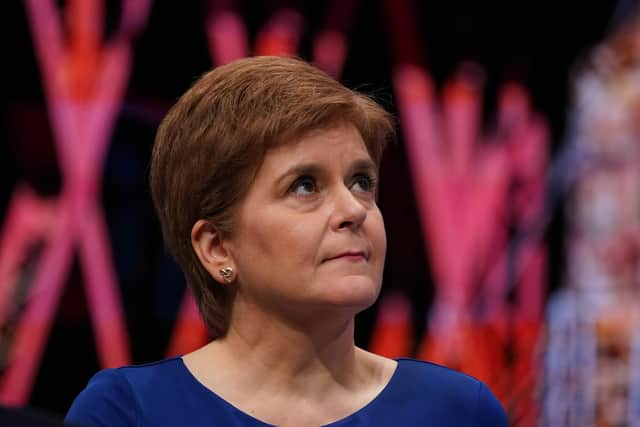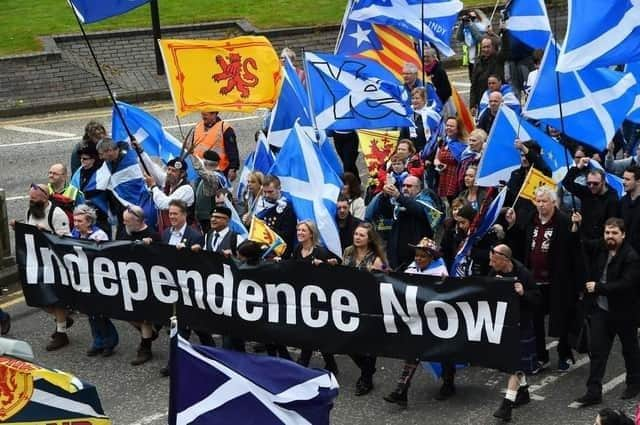SNP should pause referendum plan even if Supreme Court backs it, says former Yes Scotland chief
Stephen Noon said Scotland has not yet done the "nation-building" necessary to hold another vote.
He made the comments during an event at the University of Glasgow hosted by the UK in a Changing Europe, a research organisation based at King's College London.
Advertisement
Hide AdAdvertisement
Hide AdThe Supreme Court is due to make a ruling on Wednesday morning on whether the Scottish Parliament has the power to hold a referendum without the UK Government’s agreement.


The First Minister wants to hold a second vote in October next year, but Downing Street has refused to agree to this.
Mr Noon, who recently called for compromise in the independence debate, said he thought the court will likely rule against the Scottish Government or decline to make a decision because the case is premature as no legislation has been passed by MSPs.
He said there needs to be a referendum at some point, but argued “it should come after a process of conversation in Scotland where we're actually working out, what is the future we want for our country?"
He added: "Even if it's a yes tomorrow, I would like there to be a bit of a pause, and actually design a process which leads up to a referendum where we're actually making a decision based upon what we think the Scottish people are actually wanting for the future."


Mr Noon continued: "The ideal for me would be getting to a place where you've got a proposal which commands the support of 55, 60 per cent of the people of Scotland, and you then put that to a referendum. As a supporter of Yes, that has to be a process that doesn't shut off independence as an option."
Ms Sturgeon has said the SNP will fight the next general election as a “de facto” referendum if the Supreme Court rules against the Scottish Government.
Asked about these plans, Mr Noon, who was a senior policy adviser to former first minister Alex Salmond, said: "I think the better option is to engage in this process which is about uniting the people of Scotland rather than something else, another campaign.
Advertisement
Hide AdAdvertisement
Hide Ad"Independence needs not just winning campaigns, it needs nation-building. And we haven't yet done the nation-building necessary to have an independence referendum, in my view, in the way that we had the nation-building in the 1990s to create the Scottish Parliament."
He was taking part in a panel discussion with Conservative MSP Donald Cameron, former Scottish Labour leader Kezia Dugdale and former SNP MP Stephen Gethins.
Ms Dugdale, who is now director of the John Smith Centre at the University of Glasgow, said the SNP will have to "revisit" its plan to make the next general election a de facto referendum because “the poverty pandemic the country is facing just now means it will be impossible for the SNP to make the next election about the constitutional question”.
Earlier, an economist said the disastrous mini-budget should act as a warning to an independent Scotland about what happens when governments are not perceived to be serious about fiscal responsibility.
Thomas Pope, deputy chief economist at the Institute for Government, said Scotland spends more on public services per person than the rest of the UK. He said: "A deficit that large would not be sustainable indefinitely."
Mr Pope said small advanced economies “tend to run a tighter fiscal policy than the Scottish deficit would imply, but also than the UK Government has tended to run in the past few years”.
He added: "I don't think it's controversial – although I'm sure you will tell me if you think it is – that there will need to be some kind of consolidation over the medium term for an independent Scotland to become fiscally viable.
"There's plenty of debate about how quickly that would need to happen, and I'm not saying that this is necessarily something that would need to happen overnight or very quickly, but it would need to happen over time. It would likely be a condition of EU accession as well, and a failure to do it would mean higher costs of borrowing.
Advertisement
Hide AdAdvertisement
Hide Ad"And if perhaps three months ago people were maybe a bit sceptical about how much it really mattered if you had quite high debt and were committing to borrowing quite large amounts – maybe financial markets are just much more relaxed than they used to be – I think the mini-budget debacle down south probably shows some of what could happen if a government were not perceived to be serious about its fiscal sustainability."
Mr Pope said former prime minister Liz Truss and ex-chancellor Kwasi Kwarteng would say they were prioritising growth and similar arguments had been made by some in relation to independence.
He said: "Certainly over time it is possible that a Scottish Government, if it implemented the right set of economic policies, might be able to grow more quickly.
"A couple of cautionary notes on that. One is that it probably would require some quite difficult and quite unpopular decisions. For example, to prioritise some industries, and that necessarily means deprioritising and accepting decline in others.
"And I think in general, down south, what happened there probably shows the folly of banking on growth, and banking on the proceeds of growth before you deliver those policies that may be necessary to provide it."
Comments
Want to join the conversation? Please or to comment on this article.
